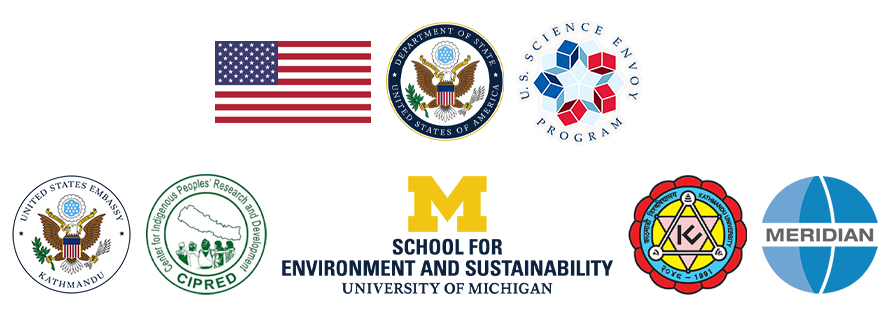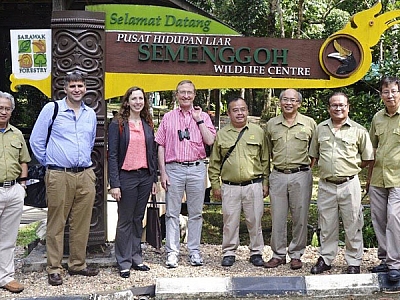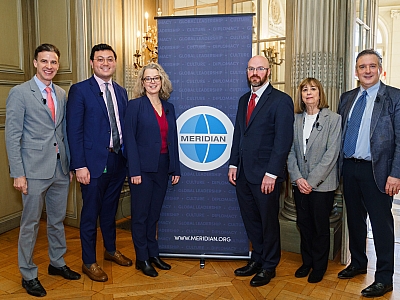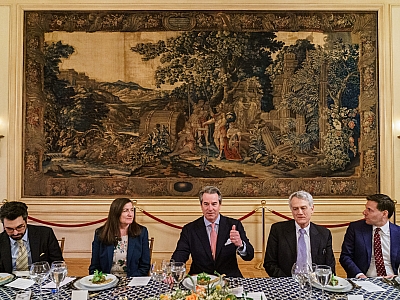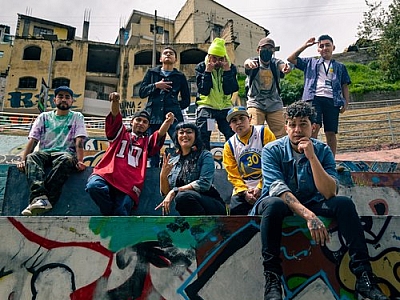International Conference And Workshop On Indigenous Led Research And Education In Nepal

EVENT DETAILS
The International Conference and Workshop On Indigenous Led Research And Education In Nepal is being organized on September 26 and 27 in Katmandu, Nepal as part of the U.S. Department of State’s Bureau of Oceans and International Environmental and Scientific Affairs U.S. Science Envoy Program implemented in partnership with Meridian International Center. The event is organized as part of Dr. Kyle Whyte, U.S. Science Envoy, White House Environmental Justice Advisory Council Member, and Professor at the University of Michigan visit to Nepal and is being planned with the support of CIPRED - the Center for Indigenous Peoples' Research and Development led by Dr. Pasang Dolma Sherpa, Director and Visiting Faculty in the School of Education of Kathmandu University; the University of Michigan’s School for Environment and Sustainability; Kathmandu University; and the U.S. Embassy in Nepal.
The conference and workshop aim to foster high impact exchange and coordination of solutions to address climate and environmental issues through enhancing support for Indigenous peoples’ and local communities’ knowledge and rights, with emphasis on the role of Indigenous-led research and education. Special attention will be given to sharing the recent U.S. White House Guidance on Indigenous Knowledge; successful cases of Indigenous-led research and education in the U.S, Nepal, and globally toward addressing climate and environmental issues; and new strategies for how Indigenous knowledge and rights can be supported across different sectors, including government agencies, businesses, research institutions, and non-governmental organizations.
CONFERENCE
Tuesday, September 26, 2023 | 8:00 AM – 5:00 PM (GMT+5:45)
WORKSHOP
Wednesday, September 27, 2023 | 8:00 AM – 2:00 PM (GMT+5:45)
Location: Mariott Kathmandu Hotel, Manakamana Marg, Kathmandu 44600, Nepal
View Full Schedule Below:
Background and Rationale
At the global level, Indigenous Peoples’ knowledge and rights have come to the fore in recent years as sources of solutions for addressing climate change, biodiversity, and sustainable resource development. However, in many places, this global attention has not fostered strategies for implementation of Indigenous knowledge and rights by governments, funders, and organizations at the regional and national levels. Considering Indigenous peoples are 6.2% of the world’s population, yet contribute to safeguarding more than 80% of the global biodiversity (IPBES, 2019), enhancing the practices supporting Indigenous knowledge and rights is critical for climate resilience and conservation (IPCC, 2022).
Indigenous peoples must have strong research and educational institutions if their knowledge and rights are to be fully implemented regionally and nationally. Such institutions furnish information about the exact issues Indigenous peoples are facing, including the development of solutions that are feasible under regional and national conditions within which particular Indigenous peoples live. Such institutions can cultivate and disseminate Indigenous knowledge ethically, consensually, and in ways that are beneficial to communities and that respect their rights. Indigenous leaders, researchers, and knowledge holders everywhere have felt an urgency to cultivate Indigenous led research and education institutions on climate and the environment precisely to facilitate credible knowledge about solutions.
Learn More About the U.S. Science Envoy Program
More from the U.S. Department of StateEvent Schedule
TUESDAY, SEPTEMBER 26, 2023
08:00 - 08:45 | Breakfast & Registration
08:45 - 09:00 | Chairing the Guests: Hon. Ram Bahadur Thapa Magar, Ambassador Dean R. Thompson, Dr. Bhola Thapa, Mr. Gokul Prasad Gharti Magar, Mr. Gelje Sherpa and Ms. Nimi Sherpa
09:00 - 9:35 | Opening and Welcome
- Welcome & Overview of the event by Dr. Kyle Whyte, University of Michigan, and Dr. Pasang Dolma Sherpa, Executive Director of CIPRED & visiting faculty of Kathmandu University, School of Education
- The Ambassador Dean R. Thompson, US Embassy, Nepal
- Dr. Bhola Thapa, Professor & Vice Chancellor, Kathmandu University
- Hon. Ram Bahadur Thapa Magar, Chairperson of Indigenous Commission, Nepal
10:00 - 10:15 | Remarks from U.S. Science Envoy for Indigenous Knowledge and White House Advisor on Environmental Justice, Dr. Kyle Whyte
10:15 - 10:30 | Keynote Addresses on Advancing Indigenous Research and Education
- Dr. Surichai Wun’Gaeo, Professor, Chulalongkorn University, Thailand
- Dr. Bal Chandra Luitel, Professor, Kathmandu University, Nepal
- Dr. Bernard Perley, Professor, University of British Columbia, Canada
10:45 - 11:00 Tea Time
11:00 - 12:30 Panel 1: Successful Nepali Indigenous research and education
- Ms. Nimi Sherpa, Chairperson, National Indigenous Women’s Federation (NIWF)
- Mr. Gelje Sherpa, Chairperson, Nepal Federation for Indigenous Nationalities (NEFIN)
- Mr. Gokul Prasad Gharti Magar, Vice Chairperson of Nepal Foundation for Development of Indigenous Nationalities (NFDIN), Nepal
- Dr. Pasang Yangjee Sherpa, Assistant Professor, University of British Columbia, Canada
- Dr. Pasang Sherpa, Chairperson of CIPRED & Associate Professor at Tribhuvan University, Nepal
- Mr. Mrigendra Bahadur Karki, Executive Director, Center for Nepal and Asian Studies (CNAS)/Tribhuvan University
12:30 - 13:00 | Lunch
13:00 - 14:30 | Panel 2: Indigenous education and development globally
- Mr. Mrinal Kanti Tripura, Director, Maleya Foundation, Bangladesh
- Dr. Upolu Luma Vaai, Professor and Principal of Pacific Theological College, Fiji
- Mr. Lakpa Nuri Sherpa, Environment Coordinator, AIPP
- Mr. Samuel Nguiffo, Director, Center for Environment and Development, Cameroon
- Mr. Andy White, Professor of Practice, University of Michigan
14:30 - 15:00 | Tea Time
15:00-16:30 | Panel 3: Funding Mechanisms and Programs for Indigenous Research and Education: Current Practices and Future Ideas
- Ms. Karen Welch, Deputy Mission Director, USAID Nepal
- Mr. Ugan Manandhar, Advisory on Climate Change and Environment Office, FCDO, UK
- Mr. Vijaya Singh, Assistant Resident Representative, UNDP
- Mr. Michael Croft, Head of Office and UNESCO
- Ms. Caroline Mary Sage, World Bank
16:30 - 17:00 | Closing Session
- Wrap-up and Vote of Thanks by Dr. Kyle Whyte and Dr. Pasang Dolma Sherpa
WEDNESDAY, SEPTEMBER 27, 2023
08:00-09:00 | Breakfast & Registration
09:00-10:00 | Review/Update from Day I from participant: Presentation and Reflection
- Dr. Kyle Whyte on the importance of funding Indigenous research and education and the global exchange between diverse Indigenous peoples.
- Helen Magata on barriers and opportunities of climate finance for Indigenous Peoples in Asia
10:00-10:15 | Dr. Pasang Dolma Sherpa on funding Indigenous research and education, framing for group work and presentation
10:15 - 12:30 | Group Work and Presentation
How could we scale up Indigenous-led Research and Education at national and international levels for the protection, promotion, continuation and recognition of Indigenous knowledge, cultural values and practices that have been the basis for climate resilience and sustainable development?
10:15 - 11:00 | Group Discussion on the following themes
- Theme I: Indigenous knowledge systems, facilitated by Dr. Pasang Yangjee Sherpa, University of British Colombia
- Theme II: Indigenous Resilience to Climate threats, facilitated by Ms. Caroline Mary Sage, World Bank
- Theme III: Rights-Based Conservation, facilitated by Andy White, University of Michigan
11:00- 12:30 Group Presentation and Discussion
12:30 - 13:00 | Closing Session
- Wrap-up and Vote of Thanks by Dr. Kyle Whyte and Dr. Pasang Dolma Sherpa
13:00 - 14:00 | Lunch
Our Partners
